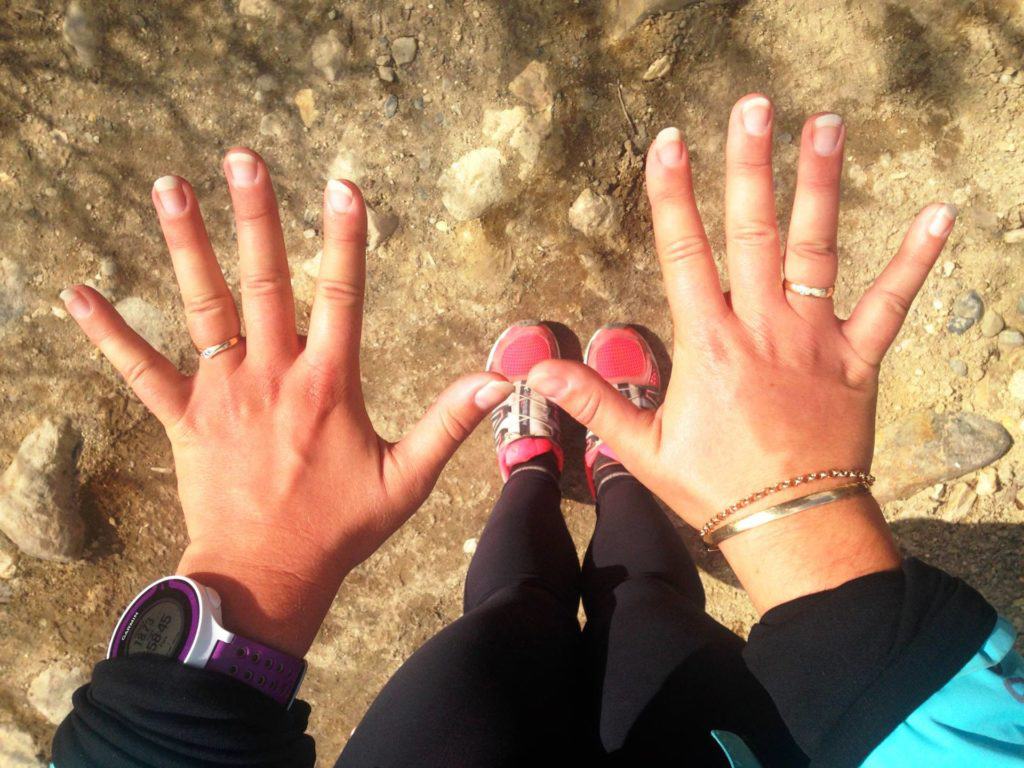
Running this past week has been challenging. An accident in the gym pinched my left thumb nail between weights causing a massive blood blister under the nail. Every time I run the swelling of my hand pushes even more pressure under my blackened thumb nail. That made me start to think and ask myself why running made my thumb swell.
Why do my hands swell when I run? Very simply, your hands swell when you run because it is your body’s most effective way, after sweating, to regulate the heat you build up while running.
Although regulating body temperature is the most common reason behind swollen hands, there are some other possible causes. Some of those causes can indicate a serious issue that you need to be aware of.
Heat Response
In general, the human body reduces heat both through the evaporation of sweat, as well as pumping as much warm blood into your skin capillaries as possible.
That amount of blood/fluid pumped into your skin will make all of your skin more puffy and appear swolen.
Your hands are a little different from the rest of your exposed skin. Your hands and fingers have a massive surface area of skin compared to volume. This makes your hands extra effective at dissipating heat. Sort of in the same way as an elephant uses its ears. As a result of this, your hands will seem more swollen than any other part of your body.
Increased Blood Flow
As you start your run, put in a surge, or hit a hill your body needs blood to the heart, lungs and legs. Your hands don’t feature in that equation.
As a result, the capillaries in your hands expand, creating a kind of vacuum to try and pull more blood flow. The capillary expansion starts to swell your hands.
As soon as your pace eases or you crest as soon as you slow your pace or crest your hill blood suddenly rushes back to your hands causing even more swelling.
Fluid Leakage
Blood vessels and capillaries are porous. So every time there is an increased blood pressure build up, you get some fluid leakage into the surrounding soft tissue.
Normally this type of fluid leakage is easily taken care of by your lymphatic system. However, your lymphatic system has a limit to rate at which it can reabsorb fluid from soft tissue.
So if you are leaking fluid into your soft tissue faster than your lymphatic system can clear the fluid, you will have a build up of fluid.
Add to this the centrifugal force of your arm swing while running and the excess fluid will pool in your hands and fingers.
The good news is that as soon as you finish your run, your lymphatic system will be able to catch up and remove the excess fluid quickly.
A side note here is that any tight rings, watch straps or bracelets will slow down the rate at which your lymphatic system will clear soft tissue fluid. That is why I advocate not wearing rings or restrictive bracelets on a long run and loosten the strap on your GPS watch as soon as you finish your run.
Hyponatremia
Hyponatremia is less common than the other reasons that your hands swell. It is, however, potentially far more dangerous.
It is well known that managing hydration is key to optimizing your athletic performance. Over the years this lead to recommendations to increase hydration in warmer temperatures to combat fluid loss through sweating.
Technically, hyponatremia is defined as when blood sodium drops to below 135mmol/L.
Exercise-induced hyponatremia was first diagnosed at the finish line of the 1981 Comrades Marathon in Durban, South Africa. This lead to a research project conducted by the Department of Sports Science at the University of Cape Town.
At the end of the research period, a paper was published in 1985 by Prof. Timothy D Noakes, et al. Water intoxication: a possible complication during endurance exercise. Medicine and science in sports and exercise 17: 370-375, 1985 – Noakes TD, Goodwin N, Rayner BL, Branken T, and Taylor RK.
Although hyponatremia does occur in endurance athletes, the prevalence tends to be far higher in ultra endurance events of seven hours or longer where around 10% of athletes show symptoms.
Because the condition is caused by drinking too much water and sweating out too much salt it is slower athletes that are at far greater risk than elite runners, simply because they are moving slow enough to be able to drink and ingest more water.
In their paper Hyponatremia In Athletes (2003), Murray, et al looked into the relatively higher incidence of hyponatremia among female athletes in marathons and half marathons. This stemmed from the San Diego Marathon in 2001 where 23 of the 26 hyponatremia cases were women.
On further
Their conclusion for the gender disparity in the San Diego Marathon and other half marethons was largely based on anecdotal observation. Publications targeting young women
The simplest indicator that an athlete has hyponatremia is a drastic fluctuation in body weight. A noticeable change in body weight within an event will be as a result of hydration and not a drop in body fat percentage.
Because ultra distance trail events have large distances between aid stations and limited access to fast medical assistance, most event organizers require athletes to be weighed at the start and upon arrival at each aid station.
Edema
If your hands, ankles and feet stay swollen for ninety minutes or more after your run then it is prudent to get to an emergency room as soon as possible.
This is the indicator of
Preventing Swollen Hands
While these tactics won’t necisarily eliminate swollen hands completely, they will slow the rate at which your hands swell.
Leave the rings, bracelets, and bangles at home. These will create restrictions that hinder fluid draining from your hands. If your GPS watch starts feeling restrictive, loosen the strap mid-run.
During your run occasionally make fists and stretch your fingers. That will promote fluid movement in your hands and prevent the pooling of fluid in your fingers.
Make sure that your electrolyte and hydration balance is right for the type of climate where you are running.
Related Questions
Why do my hands swell while I am hiking? Because you move relatively slowly while hiking, compared to running it is easier to keep drinking water often. After all, we have all read the reports that staying hydrated is good for you. However, too much of a good thing is not good at all. Swollen hands are a clear indication that your electrolyte balance is out, a potentially dangerous situation.
Why do my hands swell in the heat? Your body reduces heat by pumping as much warm blood into your skin capillaries as possible. Your hands and fingers have a massive surface area of skin compared to volume. This makes your hands extra effective at dissipating heat. As a result of this, your hands will seem more swollen than any other part of your body.
